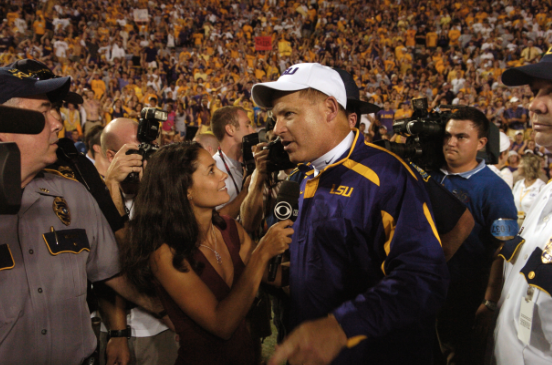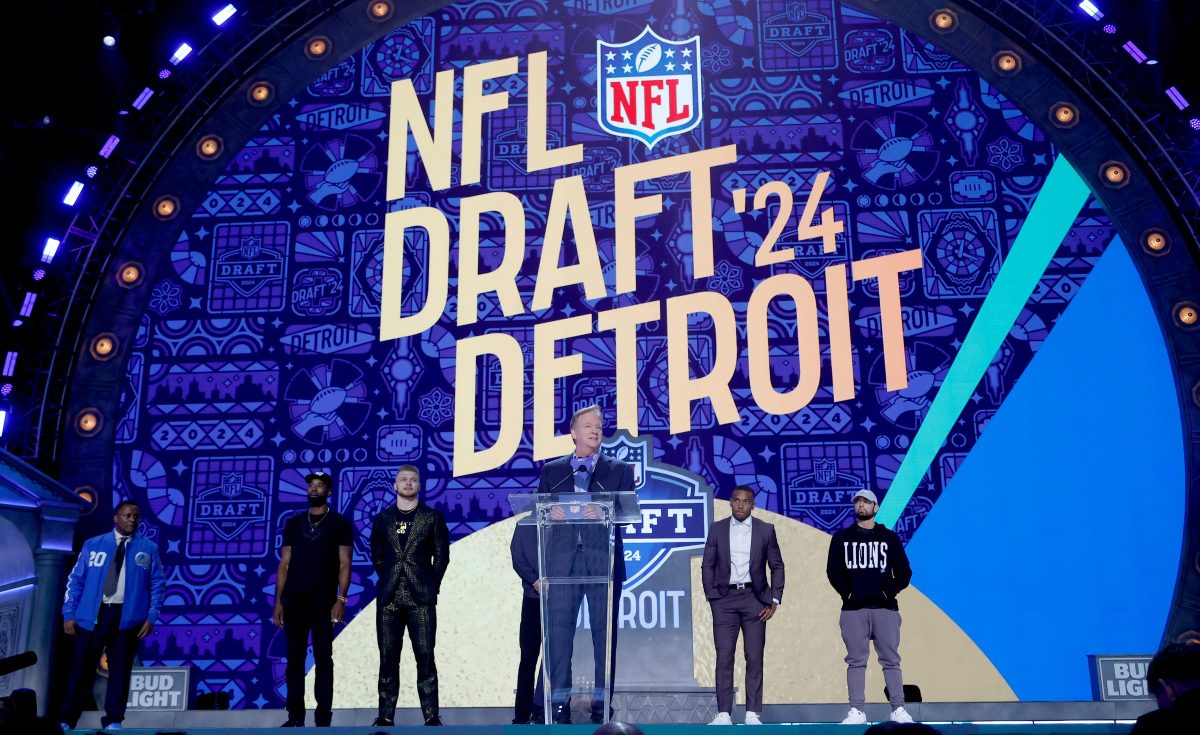Tracy Wolfson has been a sideline reporter with CBS Sports dating back to 2004 when she was with the SEC football crew with Verne Lundquist and Gary Danielson until the 2013 season. After doing a handful of NFL games in the 2013 season including the playoffs, Wolfson joined the NFL on CBS full-time in the 2014 season as the sideline reporter for Thursday Night Football and on various Sunday afternoon games with Jim Nantz and Phil Simms.
In addition to working college and pro football, Wolfson is the lead sideline reporter for the NCAA Final Four as well as working some NBA on TNT games.
This football season has been unique for Tracy as she will have worked a total of 30 NFL games with Nantz and Sims, the most for any broadcast crew since 1986 and 1987 when Don Criqui and Bob Trumpy worked 37 games for NBC Sports/NBC Radio.
Awful Announcing had the opportunity to speak with Wolfson on the day before the AFC Championship. Among the subjects discussed, how working the sidelines in the SEC differs from the NFL, balancing being a mom to three sons and traveling on the road, and learning a tip from Green Bay’s Aaron Rodgers on how to keep warm.
Awful Announcing: After being on the SEC for ten years, you’re now on the NFL. What’s the adjustment been like?
Tracy Wolfson: It’s a big adjustment. The games are different. The role of a sideline reporter is different, especially because I spent ten years in the SEC, I knew my crew well, I knew the teams well, I knew the Sports Information Directors well. You’re able to get access and insider information a lot easier than coming into a new place.
I’m making new relationships, forming new relationships, that was the number one thing I had to do coming in here is really trying to form those relationships, know who I need to go to when I need to get a story or I needed some access, talking to players and coaches before games. A lot of them might have not known who I was and here I am just trying to do my job. So that was a big difference.
The role is different, you don’t do as many interviews as you did (in the SEC), you’re not sticking a microphone in someone’s face all the time at halftime. Some coaches allow you to, others coaches don’t. I love that side of it. That’s one of my favorite things about being a reporter is asking those questions, trying to illicit those responses that the fans want to hear. So that’s a little bit different as well and you’re really limited.
I mean the game is so much shorter in the NFL than it is in college so all of a sudden, the next thing you know, the game is over. You’re limited in your time also of when you can do a report and how quickly you can get a report in, when you sell it and when it gets onto the broadcast so that’s a difference too.
AA: How much was there of a learning curve from college where you said you had more time, halftime is much longer and you’re able to develop some storylines as opposed to the NFL where you said everything is much shorter?
TW: It took an adjustment and I think one of the best things about the move is it kind of humbles you a little bit and it challenges you. And after ten years, you feel you can do the job in your sleep or with your eyes closed and I think it just is a new challenge and that you realize, looking back on the season, I said, you know what? Next year I’m going to this and I can improve here or I like how I did that report and maybe this would have been better if I said this and how do I react when a coach doesn’t want to give you anything coming out of halftime and you’re supposed to do a report and you have nothing, you know, so I think you learn those things and it does. It humbles you and it also reinvigorates you and gets you excited about the next season and challenges you.
AA: I remember we did a podcast and we talked about how you had those relationships with the SEC coaches, they knew you and now you’re in a situation where you have to develop new relationships. Did you have any difficulty in finding these relationships with the coaches and players?
TW: Fortunately, there is an overlap a little bit. A lot of the coaches, some of them have come from the SEC, especially the players come from the SEC. Coaches recognize me, but there is still that trust factor and I think one of the best things is really trying to form relationships with the coordinators, talking to them. They have that time, they maybe want to get their name out, they might be younger, more eager. And then the players. I go directly to those SEC players that I know and they know me. And then you try to push the envelope a little bit.
I haven’t had any pushback, it’s been tremendous, but you also learn the coaches, their personalities, the players’ personalities, who’s going to talk before gameday, who to go up to, who not to go up to and you learn that way as well.
AA: Did you talk to any current NFL sideline reporters to get a feel for what they have to deal with on the sidelines?
TW: Yes. I’ve spoken with Alex Flanagan, she’s a good friend of mine as well as Stacey Dales, another good friend of mine and so they gave me some pointers. Pam Oliver, I reached out to her before the season and Lesley Visser, who may not be doing the sideline anymore, was my just biggest mentor. She reached out to me. She’s always been one of my best supporters, gives me the hints and tells me how to approach things and she gave me a hint about talking to players on the sidelines. She’s like, “You know, you’re probably not going to know who they are because they’re not in their pads, they’re in their numbers and they’re just out stretching,” and she said go ask one of the lower level guys on the team and stand with you and point everyone out. And so she’s been really helpful to me as well.
AA: You had an expanded season this year as compared to 13 games with the SEC. What was that like?
TW: Oooh. That was exhausting. Not gonna lie. It’s a whirlwind. I can’t believe it’s over already. I attack it the way I’ve always attacked everything and you just go on with your blinders on and you just focus on your job and you don’t even think about the fact of how many games you’re doing and how much you’re away from your family and all the travel you’re going to be doing, the time you’re going to wake up. I think I’ve taken 8 or 9 Red Eyes (flights) this year and you just kind of go out and do your job. That is more challenging and I will say towards the end of the season you get a little burnt out and I notice it, maybe the average fan doesn’t, but I can notice it on the air a little bit and once the Thursday nights end, you kind of see that light at the end of the tunnel. The games get bigger and better and more important and it kind of reinvigorates you and you can attack it.
It was certainly a challenge and especially when you have games that maybe aren’t as competitive at certain times. But I think when you do 30 games in a season, you’re ready for anything (laughs).
AA: You’re also doing the playoffs and the AFC Championship. What are the storylines you’re looking for in this game?
TW: First and foremost for a reporter, you have to look at the weather and we know that it’s supposed to rain throughout the whole game, not cold, but rain, so how that will affect both teams, how they prepare going in. I think that’s something we’ll keep an eye on. I always like to watch the demeanor on the sidelines.
I find Andrew Luck so fascinating because he’s kind of like a carefree spirit in a way. He has a lot of fun. Watching him and Brady and Brady is so the total opposite. He’s very, very focused. I watch their demeanor, see how they interact, you try to listen in to whatever you can get. You don’t get much from Bill Belichick at halftime so you can expect no report there and Chuck Pagano does a good job at halftime going in. He’ll give us an on-camera report.
You’ll have Arthur Jones, Chandler Jones, the brothers going up against each other, if I can talk to the parents. You have Adam Vinatieri who is always a great story. So those are a few things that you have going into the game and of course, Luck vs. Brady and anything you can get from both of those quarterbacks when you sit with them before the game on how much they respect each other.
AA: You had to deal with some weather in the SEC, but you’re dealing with a lot of NFL weather especially up here in New England. It’s been cold here, but on Sunday it’ll be raining. What are some of the tips you’ve learned in dealing with cold weather on the sidelines?
TW: Yeah, Lesley Visser gave me a great tip going into the season about keeping your feet warm and for some reason, it didn’t work as well and I was doing a game in Green Bay and I decided to ask Aaron Rodgers. It was actually was the Green Bay-New England game and I asked Aaron Rodgers about how he keeps himself warm and he talked about how many heat warmers he puts in his little muffet and then he talked about his feet and that’s really where I get cold. I’m always cold on my feet and he said, “You gotta put a foot warmer on the bottom, a layer of sock, another foot warmer on top and another layer of sock and a foot warmer on top of that” and so I did it and let me tell you, it worked! So from now on, I’m going with the Aaron Rodgers Rule of How to Keep Your Feet Warm.
AA: Wow! So three pairs of socks ….
TW: Two pairs of socks and layers of feet warmers in between.
AA: So it actually does work. Do you use hand warmers on the sidelines too?
TW: Yeah, you always do have those hand warmers on the sidelines and Mike Carey has a great company out there so he provided me battery-operated heated gloves. While you might have to charge them a little bit in between or just keep them on low, they work as well (laughs). And I’ve got layers. I have two layers of pants, two or three layers underneath. It’s usually not the body that’s cold, it’s actually the head and the feet and your face, but you’re a reporter and you gotta show your face. Everyone tells me I look so cold on the air they could probably see my red nose (laughs).
AA: But how are you going to deal with the rain? It’s going to be a consistent, driving rain. How are you going to deal with that?
TW: I’d rather it snow, I gotta be honest. I dealt with the rain in Oakland and it was a torrential downpour and that was where they won their first game. It’s going to be challenging because you’re a wet dog out there. There’s not much you can do. I’m not a big fan of walking around with an umbrella. You’re at a football game, so I just throw my baseball cap on and I’ll have my hood. Writing is really difficult, keeping your notes dry is tough, anything you write is smudging and that really is the biggest difficulty when it comes to rain.
AA: These are little tips that we never know…
TW: I know but I make sure. We have a conference call before the season with a bunch of other reporters and especially new reporters and they asked me to speak to them going into the year and these are the tips that no one else gives them. You know it’s easy to bring a talent coordinator in here and say you should act like this on the air and say this and use your voice or wear this, but it’s these little tips like how do you keep your notes dry, how do you keep your feet warm and make sure to carry a protein bar in your bag because you don’t get any time during halftime and while everyone else is eating upstairs in the press box at halftime (laughing), I get nothing, so you’re quickly trying to stay in the moment.
AA: I’ve heard one sideline reporter tries to stand next to the heaters…
TW: Not as easy! Because everyone wants the heat! I mean, you try, but I haven’t been fortunate this year (laughs)! Sometimes the cheerleaders’ heaters are the ones you can go over to …
AA: You’re a mom to three sons. How do you manage balance that especially when you had so many games and balancing that with the family?
TW: Yeah, that was the toughest challenge and that was my biggest fear going into this season and I didn’t know how that was going to be. I have three boys, 8, 5 and 3, and of course, they’re all different, I knew they’d all react differently. Looking back now though, it worked out really well. My husband is so helpful. He’s got all of them when he comes home from work or on the weekends. I have a tremendous babysitter that helps out. And staying on top of them in terms of schoolwork and making sure they don’t fall behind when I’m on the road and getting that stuff done. And then of course, taking them and driving them to sports and all of that and that balance was my biggest fear.
So I just tried to make the most of the time I was with them, do special little things. I Facetimed all of the time, and they all got it, they really did. They understand and even my three year old. His teacher said, “He knows your schedule better than you do,” (laughs) and I thought that was a really good indication. I always say that you do it until it doesn’t work anymore and it works for my family right now and they’ve been really supportive.
We thank Tracy Wolfson for taking time from a very busy schedule at the AFC Championship for taking the time to speak with us. Tracy will join Jim Nantz and Phil Simms in calling the game on CBS tonight at 6:30 p.m. ET.








Comments are closed.